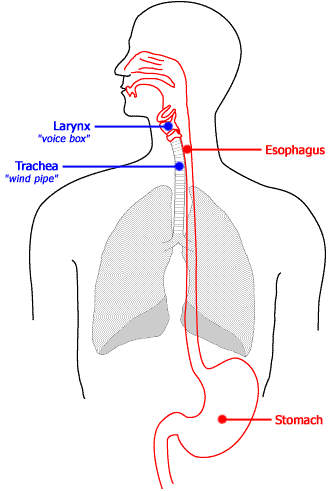What is LPR?

“Acid Reflux Disease” as advertised on TV is inflammation of the esophagus (swallowing tube) caused by acid backing up from the stomach into the esophagus. When the acid goes up into the throat or the larynx (voice box), it is termed LPR.
In LPR this acid causes irritation of the delicate tissues that cover the inside of the larynx and back of the throat. This results in various symptoms including:
- constant throat clearing
- coughing
- hoarseness
- increased mucus in the throat (phlegm)
- a feeling that something is stuck in the throat
Though they are having acid reflux, many people with LPR do not have heartburn!
What is the treatment?
The goal of treatment is to keep stomach acid and other irritating substances from rising up into the throat.
Treatments include lifestyle changes and often medications that help decrease the production of stomach acid.
It is important to remember that it may take some time after beginning treatment for many of these symptoms to improve and eventually go away.
Pump Inhibitors (PPIs such as Prilosec, Nexium, Zegerid, Prevacid, Aciphex) are good for reflux but may interfere with absorption of calcium. It’s best to take calcium citrate supplements (NOT calcium carbonate) if on PPI therapy.
Lifestyle changes to decrease GERD/LPR
Bed blocks
Elevate the head of your bed 2-6 inches with wood blocks or bricks. Using extra pillows is NOT a good substitue. Use of a foam wedge beneath the upper half of the body is an alternative.
Limit coffee
Limit coffee to 2-3 cups per day. Limiting consumption of other caffeine containing beverages (tea, soft drinks) may also be helpful.
Avoid foods that cause your symptoms
Foods to avoid are: spicy and fatty foods, tomato and citrus juices (such as grapefruit and orange juices), chocolate, mints, coffee, tea, colas, and alcoholic beverages. Especially avoid anything bubbly (carbonation)!!!
Avoid tight clothing
Tight belts, tight pants, or girdles can increase the pressure on the abdomen and stomach.
Do not lie down for 2 hours after eating
Allow gravity to work. Also, avoid bending over at the waist to pick up things. Bend at the knees instead.
Antacids
Antacids can be taken at bedtime and 30-60 minutes after each meal or as directed by your physician.
Stop smoking
If you cannot stop, decreasing the number of cigarettes you smoke may help.
Eat smaller meals
Don’t overfill your stomach.
Maintain your ideal weight
Excess weight increases the amount of pressure constantly placed on your stomach. Even small amounts of weight loss may help.
